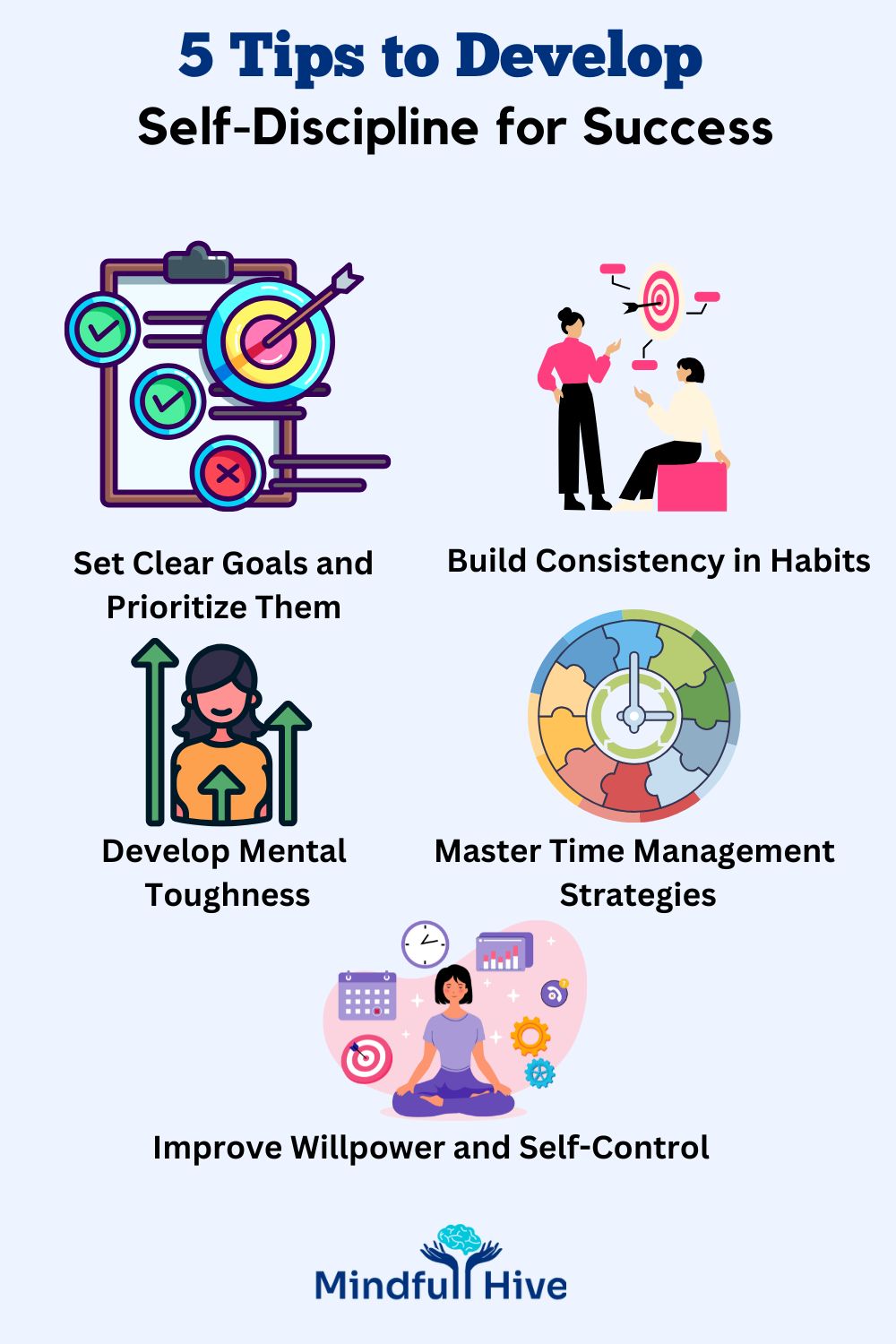Self-discipline works wonders for me. It has transformed my life in ways I never thought possible. Whether it’s staying consistent with my fitness goals, meeting deadlines at work, or sticking to healthy habits, self-discipline has been my secret weapon. But I wasn’t always this way. There was a time when distractions ruled my life, and my goals seemed out of reach. Over the years, I have learned that self-discipline is not about being perfect; it’s about being consistent.
If you’re struggling with building personal discipline and staying motivated with discipline, don’t worry. You are not alone! In this guide, I will share eight powerful tips that have personally helped me develop self-discipline in daily life and maximize productivity. These strategies are backed by mental toughness, emotional intelligence, and focus enhancement techniques to keep you on track.
The Importance of Self Discipline
Why Self-Discipline Matters
Many people struggle to stay motivated when pursuing long-term goals. Without self-discipline, distractions take over, and consistency in habits becomes difficult. I used to think motivation was enough, but I learned that motivation fades, and that’s when discipline takes over.
Here’s why self-discipline is essential:
- Boosts Productivity: Helps you complete tasks efficiently.
- Improves Time Management: Keeps you on schedule.
- Strengthens Willpower: Helps you resist temptations and bad habits.
- Enhances Focus: Keeps distractions at bay.
- Achieves Goals Faster: Helps you progress steadily towards success.
Benefits of Self-Discipline
Practicing self-discipline has changed my life in many ways, and it can do the same for you:
- Better control over emotions and reactions.
- Increased self-confidence and self-esteem.
- Improved physical and mental health.
- Higher chances of career success.
- Stronger personal and professional relationships.
- The ability to overcome distractions and stay focused.
8 Tips to Develop Self-Discipline for Success

1. Set Clear Goals and Prioritize Them
One thing I’ve learned is that without a clear goal, discipline is difficult. Whether it’s achieving fitness goals, excelling at work, or building personal discipline, having a roadmap keeps you focused.
How to Set Goals Effectively:
- Use the SMART goal-setting technique (Specific, Measurable, Achievable, Relevant, Time-bound).
- Break big goals into smaller, manageable tasks.
- Prioritize tasks based on importance and urgency.
- Keep a daily to-do list to track progress.
2. Build Consistency in Habits
I used to struggle with starting and stopping routines, but I realized that consistency is the backbone of self-discipline. Establishing daily habits makes discipline effortless over time.
Effective Habit-Building Techniques:
- Use habit stacking (linking a new habit to an existing one).
- Track progress with a habit tracker.
- Start with small, easy-to-follow routines and gradually increase intensity.
- Avoid all-or-nothing thinking – it’s okay to miss a day, but never two in a row!
3. Develop Mental Toughness
When I first started my journey, I underestimated the role of mental toughness in self-discipline. The ability to push through discomfort leads to stronger self-control.
Ways to Strengthen Mental Toughness:
- Practice mindfulness techniques like meditation and deep breathing.
- Reframe challenges as opportunities for growth.
- Use positive affirmations to reinforce self-belief.
- Push through temporary discomfort – discipline often means doing things you don’t feel like doing.
4. Master Time Management Strategies
One of the biggest obstacles to self-discipline is poor time management. Without a proper plan, procrastination can take over. I used to think I was just bad at managing time, but in reality, I lacked the right strategies.
Time Management Tips:
- Follow the Pomodoro technique (work for 25 minutes, take a 5-minute break).
- Use the Eisenhower Matrix to prioritize tasks.
- Eliminate distractions like social media notifications.
- Batch similar tasks together to maintain flow state.
5. Improve Willpower and Self-Control
Discipline requires strong willpower improvement to resist short-term temptations. I used to struggle with saying no to junk food and unnecessary purchases, but these simple tricks helped me improve.
Ways to Strengthen Willpower:
- Get enough rest and sleep to enhance mental focus.
- Use delayed gratification techniques.
- Practice self-regulation through controlled exposure to temptations.
- Surround yourself with disciplined people – habits are contagious!
6. Stay Motivated with Discipline
Motivation fuels discipline, but it’s temporary. To stay consistent, create a structured routine and remind yourself of the bigger picture. One technique I love is writing down my "why" and keeping it where I can see it daily.
Tips to Stay Motivated:
- Visualize your success.
- Celebrate small achievements.
- Surround yourself with like-minded individuals.
- Keep a journal of progress and setbacks.
7. Overcome Distractions and Temptations
Distractions used to be my biggest enemy. Learning how to overcome distractions is crucial for achieving goals through discipline.
Effective Distraction-Blocking Techniques:
- Use website blockers and focus apps.
- Work in a dedicated, clutter-free space.
- Practice mindfulness to refocus quickly.
- Set boundaries with people who unintentionally distract you.
8. Develop Personal Growth Through Self-Discipline
Personal development and self control go hand in hand. Discipline helps you grow mentally, emotionally, and professionally.
Key Personal Development Strategies:
- Read self-improvement books.
- Learn from mentors and successful individuals.
- Keep a journal to track progress and setbacks.
- Continuously challenge yourself to step out of your comfort zone.
FAQs About Self-Discipline
1. How long does it take to build self-discipline?
It varies, but research suggests that forming a habit takes 21 to 66 days. The key is consistency and commitment.
2. Can self-discipline be learned at any age?
Yes! Self-discipline is a skill that can be developed at any stage in life with practice and persistence.
3. How do I stay disciplined when I feel unmotivated?
Create a routine, eliminate distractions, and remind yourself of your long-term goals.
4. What are some quick exercises to improve self-discipline?
Practicing delayed gratification, creating a morning routine, and using habit tracking tools can quickly boost self-discipline.
5. How does self-discipline contribute to success?
It helps in achieving goals, improving productivity, and maintaining focus on what truly matters.
Conclusion
Building self-discipline is not an overnight process, but with consistency, time management strategies, and mental toughness, you can achieve your goals. Whether you're focusing on personal development, productivity hacks, or willpower improvement, staying disciplined is the key to long-term success.
By following these eight tips, you will develop self control for success and create lasting habits that lead to an improved and more fulfilling life.












[…] your goals is as important as the destination. Celebrate your progress, learn from setbacks, and stay committed to your personal and professional […]